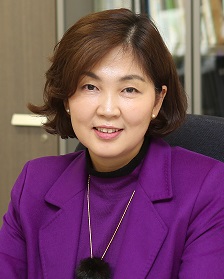About EWHA GSTI
Message from the Dean
Welcome to Ewha Graduate School of Translation and Interpretation.

Dean Hye-rim Kim
Since its foundation in 1997, Ewha GSTI has developed in parallel to South Korea’s economic growth and international exchanges. Our world-class Master of Arts program is designed to deliver professional knowledge and skills training in interpreting and translation. The outcome is competent practitioners professionally engaged in both the private and public sectors. Since 2005, our PhD program has trained practitioner-researchers who continue to contribute to the development of translation and interpreting studies.
We take pride in the expertise of Ewha GSTI faculty members, which is second to none. Our faculty are specialists in professional practice, education, and research. We are deeply committed to both systemic training and scholarly excellence through decades-long practice and evidence-based research. We strive to provide top-quality education at master’s and doctoral levels while actively engaging in international exchanges with major interpreting and translation schools in Europe, North America, and Oceania. Drawing on the models of language services in traditional multicultural societies, Ewha GSTI also actively participates in assessing and training migrant languages as a responsible member of a multicultural society.
Thanks to the Korea Research Foundation’s support for the seven-year-long project to train translators in human sciences, culture, science and technology, and promote a national image (BK21 PLUS Project), we can further enhance the experience we offer, making it more industry friendly while continuing to support student success.
Our faculty members are excited to extend their knowledge of technology-enhanced learning, teaching, and related research and have registered patents for interpreter training technology. We will continue to take advantage of the convergence of interpreting and translation with science and technology to educate upcoming linguistic and cultural talents and rise to the challenge of the fourth industrial revolution.
Thank you for your support and interest.
Hye-rim Kim
Dean
